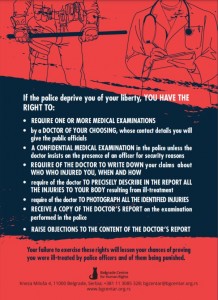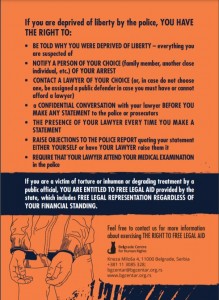 The Belgrade Centre for Human Rights (BCHR) conducted a public opinion survey to gauge how familiar Serbia’s citizens were with their rights in case they are deprived of liberty. The survey was prompted by the July 2020 protests in a number of Serbian cities, when a large number of people were illegally arrested and ill-treated by the police, both in the streets and in police stations. The many cases BCHR was involved in at the time and the proceedings initiated by BCHR against public officials who used excessive force and ill-treated individuals identified the need to inform the public at large of their rights if they are arrested.
The Belgrade Centre for Human Rights (BCHR) conducted a public opinion survey to gauge how familiar Serbia’s citizens were with their rights in case they are deprived of liberty. The survey was prompted by the July 2020 protests in a number of Serbian cities, when a large number of people were illegally arrested and ill-treated by the police, both in the streets and in police stations. The many cases BCHR was involved in at the time and the proceedings initiated by BCHR against public officials who used excessive force and ill-treated individuals identified the need to inform the public at large of their rights if they are arrested.
The survey showed that as many as 24.2% of the respondents were unable to list any of their rights in case they were deprived of liberty. Slightly over a third of the respondents (34.9%) knew that they were entitled to notify and engage a lawyer of their own choosing.
In response to a question asking them to list all their rights in case of arrest, only 2.3% of the respondents said that they were entitled to a medical examination after arrest. Such an answer was given by 1.6% of the respondents in the 18-40 age category. BCHR consequently prepared a guide on post-arrest rights and the right to a medical examination.
Individuals deprived of liberty by the police are entitled to require a medical examination by a doctor of their own choosing. Such an examination must be confidential unless the doctor insists on the presence of an officer for security reasons. Arrestees are entitled to require of the doctor to write down their allegations about how they sustained the injuries, to describe them precisely and photograph them. They are also entitled to a copy of the medical report containing all this information, and to raise any objections to the doctor’s report.
 In BCHR’s experience, it is extremely difficult to prove in court that an individual was injured injuries during arrest or in the police station in the event these injuries have not been described in detail and photographed and the doctors did not list in their reports the victim’s allegations about how they were sustained.
In BCHR’s experience, it is extremely difficult to prove in court that an individual was injured injuries during arrest or in the police station in the event these injuries have not been described in detail and photographed and the doctors did not list in their reports the victim’s allegations about how they were sustained.
Over 50% of the respondents in the 18-40 age group thought that the police had used excessive force against the participants in the July 2020 protests. Most of the respondents in this age group who held that view were between 26 and 32 years old, lived in urban settlements, and in Vojvodina and worked in the public or private sectors. Over half of the respondents thought that the protests would have lasted longer had the police not resorted to excessive force.
In order to better inform the citizens of Serbia, the BCHR has created posters and leaflets in Serbian with useful information on Post-Arests Rights, as a maesure for preventing and proving police ill-treatmen. Materials are focused on Legal Aid and Medical Report in case of police ill-treatment. Posters and leaflets are also available in English here and here.
The BCHR survey was conducted by NINAMEDIA in January and February 2021 on a representative sample at the national level. The survey results in Serbian are available here – total population and here – 18-40 age group.
The implementation of the survey and the publication of educational materials have been funded within the project Legal Support to Victims of Police Brutality during the July 2020 Protests and Analysis of Judicial and Prosecutorial Practices in Torture and Ill-Treatment Cases in the January 2018-June 2020 Period, funded by the European Centre for Not-for-Profit Law (ECNL).







